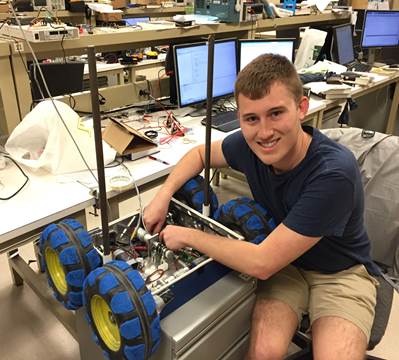Lee Awarded Prestigious NSF Graduate Fellowship
By Tarah Thomas ’16
June 29, 2018

Zachary Lee ’16, an electrical and computer engineering graduate, became the first JBU student to win the National Science Foundation Graduate Research Fellowship which provides monetary support for graduate students.
Out of 17,000 applicants, Lee was one of only 2,000 awardees to receive a three-year annual stipend of $34,000 in addition to $12,000 paid to the institution of his choice for tuition and fees.
“I decided to throw my hat in the ring,” Lee said. “I was accepted to a few grad schools yet only one offered funding. With this scholarship, the doors opened up to consider schools that I would have never been able to go to.”
Lee’s application required months of research to create a theoretical plan that would provide reliable and effective electricity to developing countries.
“Zach always had this vision,” Dr. Ted Song, associate professor of engineering said. “To apply to this NSF scholarship, you have to make a proposal to NSF. It’s not just about how you well have done, but it’s also about how you want to make a contribution to society.”
For Lee, his passion for helping others is the core motivation in his work. Lee also possesses an instinctive curiosity, a “knack for solving problems” and the skills God’s gifted him with as driving forces behind his dedication.
“What we’re doing can impact peoples’ lives; that’s what gets me through the long nights and hard times when it gets really frustrating,” Lee said.
In his junior year Lee collaborated with Song to apply for the Student Undergraduate Research Fellowship grant from the Arkansas Department of Higher Education that would fund his team’s solar maximum power point tracker. The project created a power system affordable enough for installation as well as reliable enough to provide solar power in developing countries. After many failed attempts and electrical issues, the project was completed and was presented at the Global Humanitarian Technology Conference in Seattle.
“We have a caliber of students to continue to do this [type of work]. I don’t know if I’m anything special,” Lee said. “God opened this door. I think its great for JBU, and I’m happy to bring some recognition to JBU. The University deserves it because we are a top-notch program.”
For his senior project, Lee teamed up with other senior engineers to enter the annual NASA Robotic Mining Competition. For the competition NASA invites engineers from universities around the country to attempt to design a robot that can collect and dump simulated Martian regolith—rocky material—for possible assistance with future exploration on Mars.
At last year’s competition the University’s team won the Innovation Award for their three-robot system, the first of its kind to be seen in competition.
This year Lee’s team altered last year’s design for the first autonomous three-robot system, again the first of its kind to ever appear in the history of the competition.
“Zach is motivated and [he] is not only a good student academically, he is a good servant into the community,” Song said. “I appreciate how he exemplifies Christ on campus—not just academically but also [by] being humble to love and serve others.”
Lee chose JBU out of a desire for a holistic education and the hope to grow spiritually as well as academically. The Kentucky-native heard about the University while in Ireland on a mission trip.
After visiting the University upon his return and earning a scholarship, Lee decided to attend and travelled over 500 miles along with his now wife, Rachel, a 2015 education graduate.
While at JBU Lee was a Resident Assistant for Walker Hall his sophomore year and enjoyed the camaraderie it brought. Lee said his time in the dorms and in the classrooms enabled him to “grow spiritually and to know the different traditions within the faith.” He described the joy it brought him to experience how the student body exemplified the body of Christ in Walker and across campus.
As far as choosing a graduate school for his fellowship, Lee will meet with advisers and remain open to where God puts him. “It is more about how you make the decision rather than the decision that you make,” Lee explained. “If you’re seeking it the right way, you can’t go wrong.”
“The professors, they’re the ones that deserve the recognition for what they’ve been able to do and the programs they’ve put together. They’ve been able to teach us and give us an education at a small school that rivals the best in the country,” Lee said.

